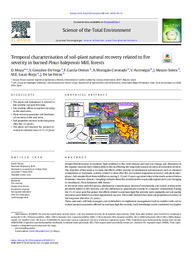Título :
Temporal characterisation of soil-plant natural recovery related to fire
severity in burned Pinus halepensis Mill. forests |
Autor :
Moya, D.
González De Vega, S.
García Orenes, Fuensanta
Morugán Coronado, Alicia
Arcenegui Baldó, Victoria
Mataix Solera, Jorge
Lucas Borja, M.E.
De las Heras, J. |
Departamento:
Departamentos de la UMH::Agroquímica y Medio Ambiente |
Fecha de publicación:
2018-05-29 |
URI :
http://hdl.handle.net/11000/6284 |
Resumen :
Despite Mediterranean ecosystems' high resilience to fire, both climate and land use change, and alterations in fire regimes increase their vulnerability to fire by affecting the long-term natural recovery of ecosystem services. The objective of this work is to study the effects of fire severity on biochemical soil indicators, such as chemical composition or enzymatic activity, related to time after fire and natural vegetation recovery (soil-plant interphase). Soil samples from three wildfires occurring 3, 15 and 21 years ago were taken in the south-eastern Iberian Peninsula (semiarid climate). Sampling included three fire severity levels in naturally regenerated (and changing to shrublands) Pinus halepensis Mill. forests.
In the short-term post-fire period, phosphorus concentration, electrical conductivity and urease activity were positively linked to fire severity, and also influenced β-glucosidade activity in a negative relationship. During the 15–21-year post-fire period, the effects related to medium-high fire severity were negligible and soil quality indicators were linked to natural regeneration success. The results showed that most soil properties recovered in the long term after fire (21 years).
These outcomes will help managers and stakeholders to implement management tools to stabilise soils and to restore burned ecosystems affected by medium-high fire severity. Such knowledge can be considered in adaptive forest management to reduce the negative effects of wildfires and desertification, and to improve the resilience of vulnerable ecosystems in a global change scenario.
|
Palabras clave/Materias:
Fire severity
Aleppo pine forests
Ecosystem response
Soil quality indicators
Post-fire restoration
Land management |
Área de conocimiento :
Ciencias del medio ambiente |
Tipo documento :
application/pdf |
Derechos de acceso:
info:eu-repo/semantics/openAccess |
DOI :
https://doi.org/10.1016/j.scitotenv.2018.05.212 |
Aparece en las colecciones:
Artículos Agroquímica y Medio Ambiente
|
 La licencia se describe como: Atribución-NonComercial-NoDerivada 4.0 Internacional.
La licencia se describe como: Atribución-NonComercial-NoDerivada 4.0 Internacional.
.png)
